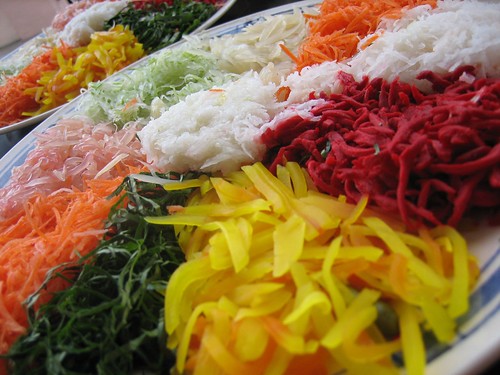While Visions of Sugar Plums Danced. . .

Saturday, September 19, 2009
Low Sang in Setiawan !
Photo note:
"This was taken during my trip to Setiawan, Perak. For Chinese New Year.
"Low Sang" (cantonese language "Low" is mix, "Sang" is raw) is a Chinese New Year tradition - all related to "Abundance, Prosperity & Vigor". Th is was prepared by my mom-in-law. A vegetarian "low sang". Raw fish was not added. A labour intensiveness dish of chopping and finely slicing of ingredients.
She added lemon juice too.
For me, the main reasons for doing this are; being surrounded by your relatives and friends (come together - come back from other states/countries), saying good wishes while mixing and tossing, and enjoying the food together.
This tradition is more widely known as "Yu sheng or Yee Shang".
(cantonese language "Yu" is homophone for the word for abundance - literally means Fish, "sheng/shang" is Raw)
The delicacy was invented 1,500 years ago in southern Chinese coastal areas such as Chaozhou and Shantou, during the Song Dynasty. According to legend, a Chinese female deity known as Nüwa (女娲) created mankind from clay and mud on the seventh day of the first month of the Lunar New Year. From then on, this day was known as the "Birthday of Man". It is believed that the fishermen and seafarers of ancient Southern China were very observant of this myth. On this day, yusheng would be prepared in feasts or religious ceremonies, not just to commemorate the event but also to show respect to Nüwa. In the 19th and early 20th centuries, many of these fishermen immigrated to Southeast Asian countries like Malaysia and Singapore in search of a better life. They brought this traditional dish along with them.
Now, in the 21st century, "Lo Hei" -- tossing yusheng -- is a Singaporean/Malaysian Chinese New Year custom for families and friends to gather around the table and, on cue, proceeding to toss the shredded ingredients into the air with chopsticks while saying 吉祥话 (Jíxiáng Huà, auspicious wishes) out loud to mark the start of a prosperous new year.
Typical ingredients include: fresh salmon, daikon (white radish), carrot, red pepper (capsicum), ginger, kaffir lime leaves, Chinese parsley, chopped peanuts, toasted sesame seeds, Chinese shrimp crackers (or fried dried shrimp) or fried pieces of flour, five spice powder. The dressing is made primarily from plum sauce"
From : en.wikipedia.org/wiki/Yusheng
pachome2.pacific.net.sg/~willows5/singlish_Y.htm#yusheng
en.wikipedia.org/wiki/Pickled_onion
en.wikipedia.org/wiki/Daikon = White Radish
Subscribe to:
Post Comments (Atom)
Foods to Love, Words to Savor

Custom Search

No comments:
Post a Comment